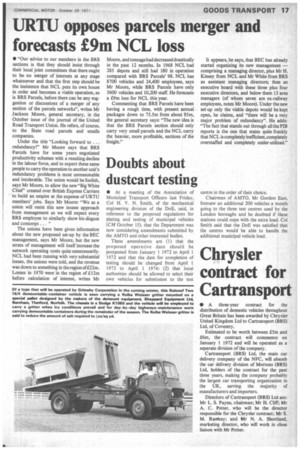URTU opposes parcels merger and forecasts Om NCL loss
Page 19

If you've noticed an error in this article please click here to report it so we can fix it.
• "Our advice to our members in the BRS sections is that they should insist through their local joint committees that there ought to be no merger of interests at any stage whatsoever and that the first step should be the insistence that NCL puts its own house in order and becomes a viable operation, as is BRS Parcels, before there can be any suggestion or discussions of a merger of any section of the parcels networks", writes Mr Jackson Moore, general secretary, in the October issue of the journal of the United Road Transport Union. He refers, of course, to the State road parcels and smalls companies.
Under the title "Looking forward to . . . redundancy!" Mr Moore says that BRS Parcels have for some years negotiated productivity schemes with a resulting decline in the labour force, and to expect these same people to carry the operation to another unit's redundancy problems is most unreasonable and intolerable. The union would be foolish, says Mr Moore, to allow the new "Big White Chief" created over British Express Carriers to build an empire at the expense of URTU members' jobs. Says Mr Moore: "We as a union will resist this new insane approach from management as we will expect every BRS employee to similarly show his disgust and contempt ... "
The unions have been given information about the new proposed set-up by the BEC management, says Mr Moore, but the new strata of management will itself increase the network operating costs quite unnecessarily. NCL had been running with very substantial losses, the unions were told, and the revenue was down to something in the region of £22m. Losses in 1970 were in the region of £12m before calculation of interest, writes Mr Moore, and tonnage had decreased drastically in the past 12 months. In 1968 NCL had 285 depots and still had 180 in operation compared with BRS Parcels' 98. NCL has 8700 vehicles and 24,400 employees, says Mr Moore, while BRS Parcels have only 3600 vehicles and 10,200 staff. He forecasts a £9m loss for NCL this year.
Commenting that BRS Parcels have been haying a rough time, with present annual • packages down to 75.5m from about 85m, the general secretary says: "The new idea is that the BRS Parcels section should only carry very small parcels and the NCL carry the heavier, more profitable, sections of the freight." It appears, he says, that BEC has already started organizing its new management — comprising a managing director, plus Mr H. Kinsey from NCL and Mr White from BRS as assistant managing directors; then an executive board with these three plus four executive directors, and below them 13 area managers (of whom seven are ex-railway employees, notes Mr Moore). Under the new set-up only the viable depots would be kept open, he claims, and "there will be a very major problem of redundancy". He adds: "The fact that stands out through all the PIB reports is the one that states quite frankly that NCL is completely inefficient, completely overstaffed and completely under-utilized."












































































































































